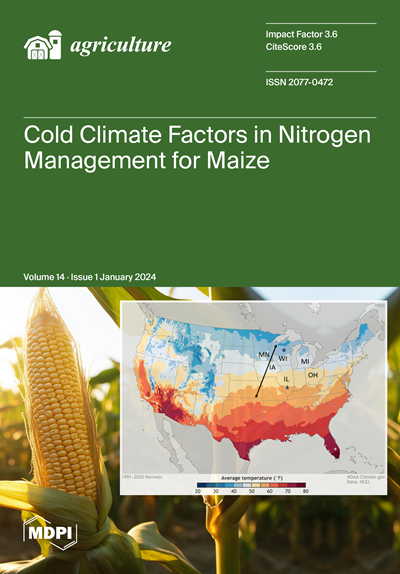The Productivity of Crop Rotation Depending on the Included Plants and Soil Tillage
IF 3.6
2区 农林科学
Q1 AGRONOMY
引用次数: 1
Abstract
Crop diversification in rotations is an important part of sustainable crop production. The aim of this research was to analyse soil tillage and crop rotation influence on the yield (t ha−1) of different field crops, their energy yield (GJ ha−1) and the economical profitability (EUR ha−1) of crop rotation. The field trial was conducted in Latvia during four harvest seasons (2017–2020) in a long-term experiment that started in 2009. Three crop rotations with a different share of winter wheat (Triticum aestivum) were studied: 100% wheat (repeated sowings), 67% wheat (three-year rotation with winter oilseed rape (Brassica napus ssp. oleifera) and two years following wheat) and 25% wheat (four-year rotation: field bean (Vicia faba)–wheat–winter oilseed rape–spring barley (Hordeum vulgare). Conventional and reduced soil tillage systems were used for rotation variants. Crop rotations “67% wheat” and “25% wheat” ensured significantly higher average wheat grain yields in comparison to “100% wheat”. Wheat and oilseed rape were the most valuable crops in terms of accumulated energy and economic value in this trial. Higher energy yields were gained from variants in the rotations “67% wheat” and “25% wheat”. Average gross profit was higher from crop rotations with diverse crops, mainly due to the positive forecrop effect on winter wheat.作物轮作的生产力取决于所包括的植物和土壤耕作方式
作物轮作多样化是可持续作物生产的重要组成部分。本研究的目的是分析土壤耕作和轮作对不同大田作物产量(t ha - 1)、能量产量(GJ ha - 1)和轮作经济效益(EUR ha - 1)的影响。该长期试验于2009年开始,在拉脱维亚进行了四个收获季节(2017-2020年)的田间试验。研究了冬小麦(Triticum aestivum)三种不同轮作比例:100%小麦(重复播种),67%小麦(3年轮作,冬季油菜(Brassica napus ssp)。油豆(Vicia faba) -小麦-冬油菜-春大麦(Hordeum vulgare) 4年轮作。轮作变量采用常规和减少土壤耕作系统。与“100%小麦”轮作相比,“67%小麦”和“25%小麦”轮作确保了显著高于“100%小麦”的平均小麦产量。从累积能量和经济价值来看,小麦和油菜是最有价值的作物。“67%小麦”和“25%小麦”轮作的变异获得了更高的能量产量。不同作物轮作的平均毛利较高,主要是由于冬小麦的正面预收效应。
本文章由计算机程序翻译,如有差异,请以英文原文为准。
求助全文
约1分钟内获得全文
求助全文
来源期刊

Agriculture-Basel
Agricultural and Biological Sciences-Food Science
CiteScore
4.90
自引率
13.90%
发文量
1793
审稿时长
11 weeks
期刊介绍:
Agriculture (ISSN 2077-0472) is an international and cross-disciplinary scholarly and scientific open access journal on the science of cultivating the soil, growing, harvesting crops, and raising livestock. We will aim to look at production, processing, marketing and use of foods, fibers, plants and animals. The journal Agriculturewill publish reviews, regular research papers, communications and short notes, and there is no restriction on the length of the papers. Our aim is to encourage scientists to publish their experimental and theoretical research in as much detail as possible. Full experimental and/or methodical details must be provided for research articles.
 求助内容:
求助内容: 应助结果提醒方式:
应助结果提醒方式:


